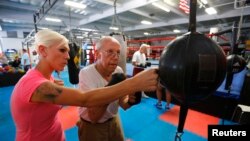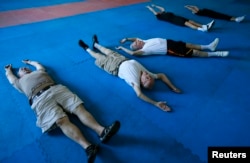The physical fitness business Rock Steady Boxing NOVA gym opened in McLean, Virginia last December.
That was the good news for 75-year-old Neil Eisner. He was diagnosed with Parkinson’s disease six years ago. He finds the boxing a helpful way to fight back against the disease.
Parkinson’s disease affects the nervous system and causes people's muscles to become weak and their arms and legs to shake.
Rock Steady Boxing, or RSB, was designed to help people with Parkinson's. The exercises in the program are meant to build specific skills.
One involves hitting a bag to work on strength. Another has trainees crawling across the floor. Eisner says the exercises help him perform everyday tasks like moving around and getting in and out of bed.
Some strengthening exercises work the vocal cords.
Eisner said his trainer is working with him to speak out loudly.
"One of the things interestingly enough is you [Parkinson's patients] tend to have a lower voice. When you have that lower voice, people can't hear you, you don't realize it. So, he asks and is getting us to bring up our voice clearly and more loudly."
Staying active important
Private trainer Alec Langstein likes working with older people because he understands their health issues and the need for them to stay active.
"My aunt has a gym in Westchester, New York, and she does a Rock Steady Boxing program there," he said. "She invited me up to her gym to check out the program. She thought it would be a perfect fit for what I do. I helped out with a few classes, and it was just, I thought, an amazing program."
The Rock Steady Boxing nonprofit company was created in 2006 by lawyer Scott C. Newman. He was looking for ways to do physical exercise after being diagnosed with Parkinson's at the age of 40. Since then, more than 500 boxing programs have been started in the U.S. and around the world.
Langstein went to the organization's headquarters in Indianapolis, Indiana, to become an RSB-certified trainer. A few months later, he opened his Rock Steady Boxing NOVA gym.
Langstein said that the RSB program centers attention on teaching balance and coordination between the hand and eye. It also teaches reaction and foot movement.
“So when I yell out certain numbers, they have to move and react at the same time. So, the brain and the body is working together.”
He added that it also helps people release some of the anger they may have from having the disease.
Improving quality of life
To understand how RSB can help Parkinson's patients, physical therapist Danielle Sequira says it is important to know what causes the symptoms.
She said that Parkinson's affects the dopamine-producing cells in the brain. Dopamine is a chemical that is important to the operation of the nervous system. A loss of dopamine can make movement difficult.
Boxing and other exercises do not cure the disease or stop the loss of dopamine. But, they can improve the patient's life experience.
Sequira said research shows that exercise helps the brain use dopamine better. She adds that, after working with Parkinson’s patients, her goal is for them to start an exercise program out in the community.
RSB seems to have helped Victoria Hebert reduce the symptoms of her Parkinson's. She has a tremor, or shake, in her left hand, and says some situations can make the shaking worse.
"Being cold, being hot, sitting with a crowd that I'm not real comfortable with, I'll start shaking. I end up having to sit on my hand just to keep it still."
But with this crowd, Hebert feels no need to hide the disease.
"That's the big part of it, sharing experiences with others," she said.
"I have to say…Over eight years of time I've never met another person with Parkinson's. Then, I came here, and it was like a whole class of 20, 25 people with it. It was kind of surprising to me, kind of surprising that I, myself, didn't reach out to anybody before that."
I’m Phil Dierking.
This story was originally written by Faize Elmasry for VOANews.com. Phil Dierking adapted the story for Learning English. Mario Ritter was the editor.
Do you know other exercises that help with diseases? Write to us in the Comments Section or on our Facebook page.
_________________________________________________________________
Words in This Story
gym, gymnasium –n. a place where people go to exercise that often has equipment and weights
diagnosed –adj. recognized to have a disease or illness
crawl –v. to move on your hands and knees
vocal cords –n. pieces of tissue in the throat that permit speech
check out –(informal) v. to look into, to learn something about
coordination –n. the process of causing something to work together correctly
yell –v. to shout, to make a loud noise
therapist –n. someone trained in treaty illness especially without drugs or operations
symptoms –n. a change which shows a disease or sickness







